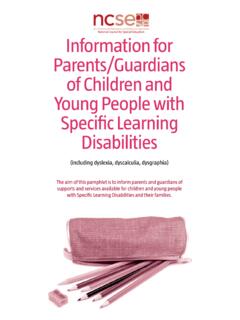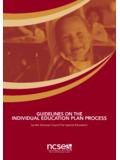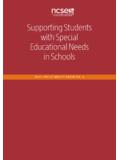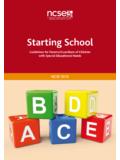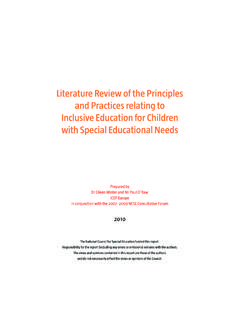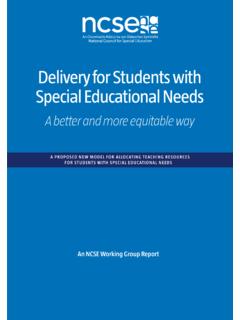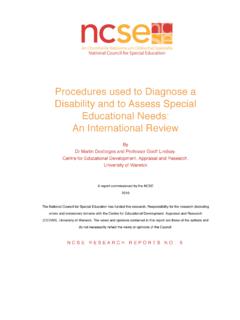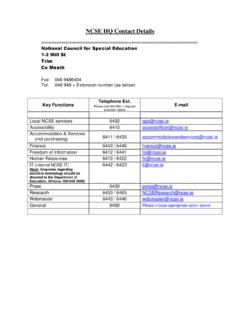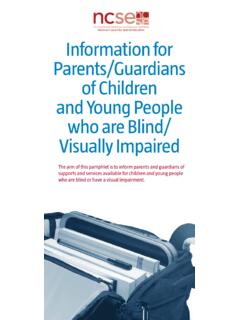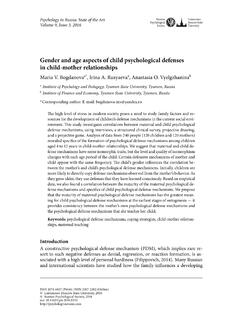Transcription of Parents of children with ASD - NCSE
1 Report to the National Council for Special Education Special Education Research Initiative Parents of children with Autistic Spectrum Disorders (ASD): A Survey of Information needs. Tara Murphy and Kevin Tierney Disclaimer The National Council for Special Education funded this research. Responsibility for the research (including any errors or omissions) remains with the authors. The views and opinions contained in this report are those of the authors and do not necessarily reflect the views or opinions of the Council.
2 2 CONTENTS Page Executive Summary 3 Chapter One Introduction 7 Chapter Two Methodology 10 Chapter Three Results 17 Chapter Four Discussion 54 Bibliography 61 Parents OF children with ASD 3 EXECUTIVE SUMMARY The primary aim of this study was to explore the information and education needs of Parents of children with Autistic Spectrum Disorder (ASD).
3 Methodology Six focus groups with Parents of children with ASD, were conducted over a two-month period in 2005. Focus groups lasted for approximately two hours each and took place in the evenings. A total of 27 mothers and 11 fathers participated. The focus group questions emerged from a literature review of Parents experiences of having a child with ASD and Parents perceptions of their information and education needs. Literature pertaining to focus group interviews (Kruger, 1988; Merton et al.)
4 1990; Morgan, 1997; Vaughn, 1996) was also reviewed. In addition, advice and guidance was obtained from two experienced lecturers/practitioners who each directed and ran several focus group interview projects within their own departments. The topic guide devised for these focus groups addressed the following questions: 1) What were Parents experiences immediately following the diagnosis of their child with an ASD? 2) What were Parents past and current information and education needs? 3) What were Parents primary sources of information?
5 4) How satisfied were Parents in terms of the quantity and quality of information offered to them? Finally, 5) What were Parents preferred sources of information? Summary of Findings The difficulties experienced by participants at the time of diagnosis appeared to be compounded by the way in which the diagnostic process was handled by the professional(s). Moreover, Parents of younger children who are likely to have EXECUTIVE SUMMARY 4 struggled to have their child s past and current needs met may anticipate a similar struggle in terms of having their child s future needs met.
6 Many Parents stated that it would have been helpful if the diagnosing professional(s) informed them about the positive as well as the negative aspects of the ASD and how it might impact not only on the child s development but on the family s way of life. It is also possible that too much negative information may be inappropriate at this time and that this added further stress and anxiety to an already delicate situation. During the diagnostic process, Parents reported having to deal with several professionals and services at the same time which often led to more stress.
7 Similarly, Parents felt that the lack of collaboration among service providers and professionals was somewhat responsible for their having to discover themselves which needs were met by the different services. Parents experiences around the time of the diagnosis may predict future family adaptation to the ASD, parental stress, Parents information and learning needs as well as the quality of the parent-professional relationship. In light of this, the diagnostic process appears to have an all-encompassing influence on Parents perceptions, experiences and sense of empowerment in the immediate and long-term future.
8 Despite the family s GP or the public health nurse being the first point of contact for many families, neither of these clinicians was perceived by Parents to be helpful in terms of being able to answer specific questions or provide them with practical information on ASDs. Parent participants reported having significant information and education needs before, during and after the diagnosis. Indeed, education was a high information priority for Parents in this study . Parents also reported wanting practical advice on how to apply what they learned from books or training programmes to everyday living with their child.
9 In terms of the child s future, many Parents were concerned about the child s level of independence and their ability to maintain relationships. Parents were also worried about what would Parents OF children with ASD 5 happen to their child if they themselves became ill and could no longer take care of them. The majority of parent participants stated that meeting other Parents of children with ASDs who had or were experiencing similar difficulties was beneficial and that strategies should be put in place to facilitate this.
10 Most parent participants searched intensely for information following the diagnosis including attending as many lectures and seminars related to ASDs as possible. Others reduced the intensity of their search for information subsequent to the critical period subsiding. This may indicate that while all Parents searched intently for information prior to and after the period of the diagnosis, only some remain active information-seekers. Different Parents may have wanted and benefited from different amounts of information.
